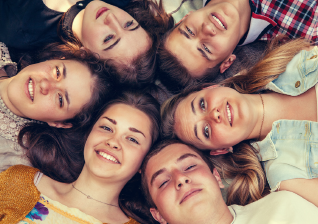FRIENDSHIP
For teenagers, good friends can be like a personal support group. They can provide:
• a sense of belonging, a feeling of being valued and help with developing confidence
• a sense of security and comfort in being with others going through the same experiences
• a source of information about the changes that puberty brings, and what’s going on physically and emotionally
• a way to experiment with different values, roles, identities and ideas
• experience in getting along with people of the opposite gender
Positive friendships are an important part of the journey to adulthood. They help teenagers learn important social and emotional skills, such as being sensitive to other people’s thoughts, feelings and wellbeing.
During the early teenage years, friendships become more intense, close and supportive. The amount that teenagers communicate with their friends increases. Teenagers usually make friends based on personal similarity, acceptance and sharing. At first, they may not get on well with their peers, but eventually when they get to know each other, they become good friends. Samegender friendships are the norm during the early high school years. As they get older, though, many teenagers also make friends with the opposite gender. In general, girls chat with each other. However, boys prefer to share activities.
The internet lets teenagers build friendships through social networking. These friendships are different from real-life relationships. In the best cases, they offer teenagers a way to connect easily and a chance to talk about sensitive issues without fear of being judged, and a chance to experiment with identity in a more or less anonymous way.

